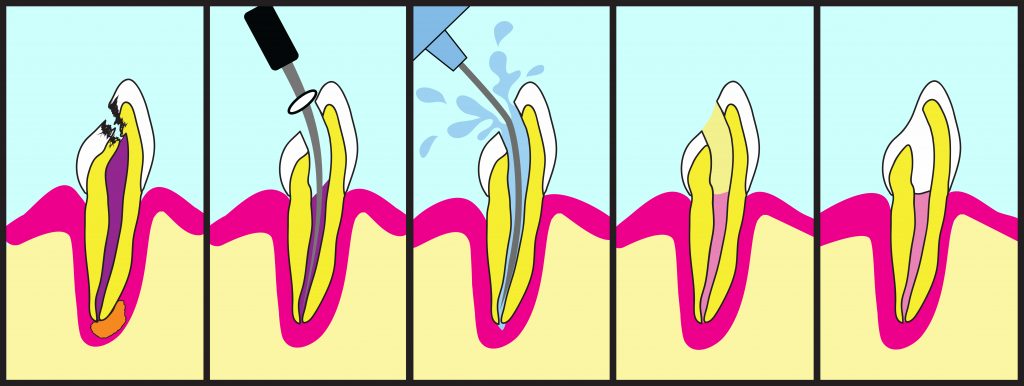Root canal therapy is necessary when the inner chamber of the tooth, called the dental pulp, becomes infected. Root canal therapy is the last treatment method available before an extraction is necessary to restore your oral health.
Unfortunately, delaying root canal treatment will only make the symptoms and the infection worse. Root canal therapy will restore your natural tooth so you won’t need to worry about replacing it. You’ll also be free of pain and able to eat whatever you want without restrictions.
Dr. Bassford is an experienced dentist who has been in practice for over 25 years. She utilizes various techniques she’s learned throughout her career and countless hours of continuing education courses to provide her patients with specialized care.
 Root Canal Therapy & Your Dental Health
Root Canal Therapy & Your Dental Health
Root canal therapy is necessary when the dental pulp becomes infected, usually by way of an oral infection or severe decay. If a tooth is decayed, bacteria can build up and spread into the pulp. When this happens, we’ll need to perform root canal therapy in order to stop the infection and save your tooth.
While many patients may fear the thought of root canal therapy, Dr. Bassford will ensure your teeth are numb prior to beginning the procedure. She also utilizes micro-current, a low-level electrical waveform that’s proven to help with acute and chronic pain. Rest assured, she’ll be in communication with you throughout the treatment to ensure you’re comfortable and pain-free.
The procedure can be completed in 6 easy steps:
- After numbing your tooth and the surrounding area, a dental dam will be placed to ensure the treatment area stays clean and dry
- A small hole will be drilled into the crown of the tooth to create access to the dental pulp
- The pulp and root canals will be cleaned, disinfected, and re-shaped
- The root canal is filled with a rubber-like material called gutta-percha
- A temporary filling is placed in the crown
- You’ll return to our office a couple of weeks later and your permanent crown will be placed

Signs You May Need Root Canal Therapy
There are several signs that may indicate you need root canal therapy, including:
- Persistent toothache
- A chipped or cracked tooth
- Loose tooth
- Tooth discoloration
- Tooth and gum sensitivity, especially to hot and cold
- Swollen gums
- An abscess is present on the gums–tiny pimple-like bump
When you have a persistent toothache, it’s best to see Dr. Bassford to prevent the problem from continuing and getting worse. If treated at the state of minimal to moderate decay, less invasive procedures such as a filling or crown would be appropriate instead of root canal therapy.
Let’s Save Your Tooth
If you have a root canal infection, we can restore your oral health so you’re free of infection and pain. Contact our office to schedule a consultation with Dr. Bassford by calling (301) 593-5500. We’ll pay close attention to all the details and start you on your road to recovery.
Frequently Asked Questions
Many patients avoid root canal therapy under the impression that it’s painful. In reality, the procedure will only cause mild discomfort, or none at all. In fact, avoiding treatment for your infection will result in far more pain.
Rest assured, Dr. Bassford will use a local anesthetic to numb your tooth before the root canal procedure so you don’t feel anything. She also uses micro-current to help with anxiety and pain.
It’s normal to feel mild discomfort after a root canal treatment, but this should fade within a few days. In most cases, patients recover quickly and can manage any discomfort with over-the-counter medications.
If your tooth still hurts a week after the procedure, this may be a sign that the treatment wasn’t successful. Call us right away if you’re experiencing pain or any other unusual symptoms.
In most cases, Dr. Bassford can complete your root canal treatment in one to two appointments. These visits typically last anywhere from 30 to 90 minutes, depending on the severity of your case. If you’re getting multiple teeth treated, you’ll likely need to schedule more than one appointment.
For a more accurate timeframe, we recommend contacting our office to schedule a consultation by calling (301) 593-5500. During the consultation, Dr. Bassford will examine your oral health and create a customized treatment plan that will include a timeframe.
Root canal therapy is used as a last resort to save your tooth prior to extraction. There’s very little risk associated with root canal therapy in comparison to an extraction. After the procedure, there’s a slight chance that the area may become infected. That’s why it’s important to choose a highly trusted dentist, such as Dr. Bassford, to perform the surgery so you can expect the best possible outcome.
On the other hand, a tooth extraction is necessary when the tooth is decayed and infected beyond repair. When you have a tooth extracted, the resulting gap can lead to bone loss due to the lack of chewing forces that are necessary for strengthening your jaw.
The missing tooth creates a gap that may cause your surrounding teeth to shift position to fill in the gap. That’s why it’s best to preserve your natural tooth and get root canal treatment while there’s still time.

